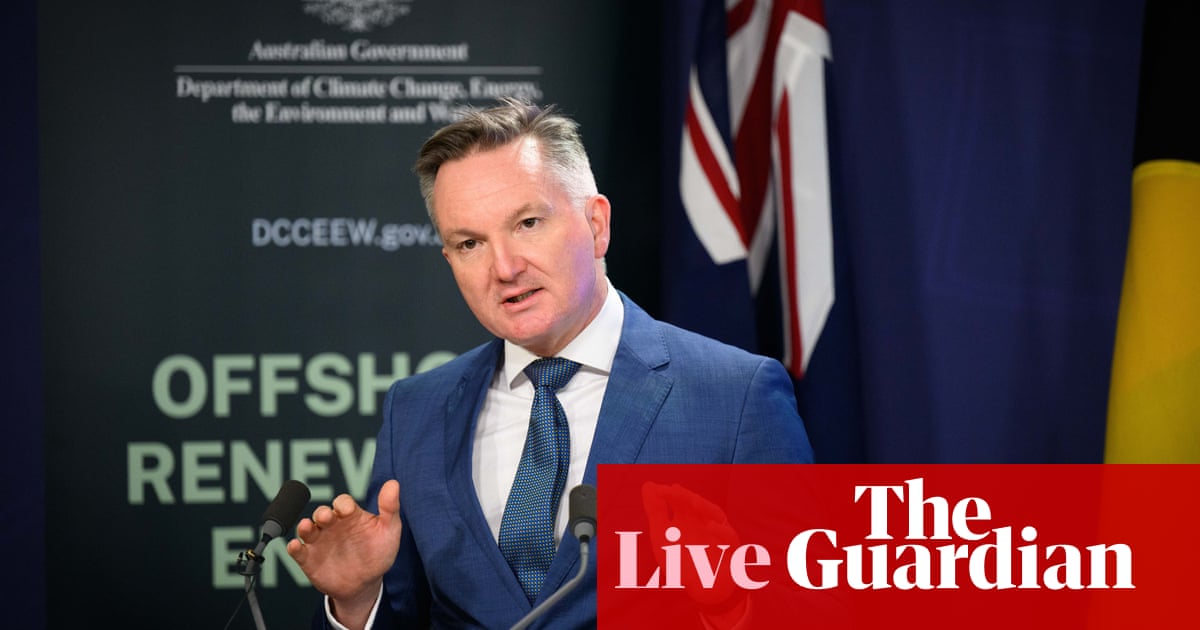Albanese government announces ‘largest-ever’ tender for renewable energy projects
Ben Smee
The Albanese government has announced Australia’s “largest-ever” tender to build renewable energy projects, which will be underwritten by the commonwealth.
The climate change and energy minister, Chris Bowen, says the release of a tender for 6GW of new power generation includes a new renewables deal with New South Wales that will provide at least 2.2GW of power supply for the state.
In November, the government announced an ambitious 32GW plan to underwrite renewables in pursuit of Australia’s target of 82% renewable generation by 2030, amid an “alarming” slowdown in private investment. The tender aims to trigger a first tranche of projects.
In addition to 2.2GW of power earmarked for NSW, 300MW has been earmarked for projects in South Australia, subject to an agreement between governments.
The government says it plans to release tenders from its capacity investment scheme about every six months until 2027. Selected projects will be offered long-term underwriting agreements that include agreed “floor” and “ceiling” revenue for investors.

Key events
NDIS minister defends scheme from critics, asks what alternative would be
Minister for the National Disability Insurance Scheme, Bill Shorten, has defended the scheme against criticism from a former productivity commission boss.
In an article in the Financial Review, Gary Banks said the organisation got it wrong when recommending the NDIS and warned that Labor’s proposed overhaul would do little to reduce its budget trajectory. Banks said in a speech:
In retrospect, the commission clearly underestimated the incentives for ‘overservicing’ that such a scheme presents and, in particular, was too optimistic about the prospects of an eventual payback to the economy.
Speaking on ABC RN this morning, Shorten said at its inception there was an “overarching faith” the NDIS should be left to the market to fix any issues, but there hasn’t been enough “market stewardship”.
If you’re going to give resources for disability, you’ve got to make sure that there are rules around how it’s used and the nature of the services provided, and there just wasn’t enough work done about making sure we had enough workforce, making sure that we had service providers who were to doing what they’re saying they’re doing, [or] even qualified to do what they’re doing.
But I don’t share Mr. Banks as negativity about just wrapping up the scheme. The alternative to having the scheme is to go back to what existed beforehand, and that was a disaster where you had to have a worst set of circumstances today than yesterday to move up the queue and get resources, and even had to be more diabolical situations tomorrow, that’s not the way to allocate resources.
Shorten questioned that NDIS critics “must understand the consequence of what they say”, because “what is the alternative? Just give up?” He called on critics to meet with him to discuss their concerns, rather than “commenting in the paper”.
We’ll have to work on fixing this together, us and the Coalition.
Treasury downgrades growth forecasts ahead of budget
Global financial uncertainty has prompted the Treasury to downgrade its growth forecasts for major economies ahead of the federal budget, AAP reports.
Geopolitical tensions in the Middle East as well as a slowdown in China has led to the rethink on global economies, with the treasurer, Jim Chalmers, warning of a “fraught and fragile” outlook internationally.
China’s growth has been downgraded by 0.25 percentage points in 2025 to 4.25%, according to Treasury forecasts. The downgrade would mean China’s growth would be the weakest period since the Asian nation opened its economy up in the 1970s.
The UK’s economy’s forecast has also been downgraded by 0.5 percentage points to 1.25% in 2025, and Japan has had its growth revised to just 0.75% in 2024, down by 0.25 percentage points after weaker than expected consumption.
Ahead of May’s federal budget, Chalmers has been meeting with G20 counterparts in Washington, and said global uncertainty had led to the revised expectations:
Events in the Middle East are casting a shadow over the global economy, compounding the concerns about lingering inflation and weaker growth.
The fraught and fragile global outlook was a big feature of discussions in Washington DC and will be a big factor as we put the finishing touches on the budget.
Further revisions on growth forecasts are expected following the release of US GDP figures on Thursday, as well as similar data for the EU later in May.
International travel closer to pre-pandemic levels than domestic at Sydney Airport
International traffic is now closer to pre-pandemic levels than domestic flights at Sydney Airport.
In the airport’s traffic and operational performance report for the first 2024 quarter, it shows international travel has had a 96.6% recovery rate to pre-pandemic levels (that is, in comparison with the first quarter of 2019). Domestic and regional travel, by comparison, had a 91.9% recovery rate.
The airport suggests this is due to lower levels of domestic business travel. Sydney Airport CEO Scott Charlton said:
The Q1 passenger data shows us that on the domestic front, higher airfares, lack of capacity and a downturn in discretionary business travel has affected demand.
This is contrasted with relatively higher seat capacity and competition on major international routes which underpinned strong international passenger volumes for the quarter.

Ben Smee
Bowen hits back at Dutton while announcing tender for renewables
The federal opposition leader, Peter Dutton, has argued in favour of building nuclear power stations to replace retiring coal-fired generators. On the ABC’s Insiders program on Sunday, Dutton queried the impact of renewables projects and said they required a “social licence”.
We can’t turn the old system off until the new one is ready. I know people want to pretend wind and solar can go around the clock, it can’t.
In a statement announcing the new renewables tender (see last post), Bowen appeared to clap back at Dutton’s comments:
The rain doesn’t always fall, but we always have water on tap because we store it for when we need it – our energy plan does just the same thing for reliable renewables.
Our plan is delivering the certainty and confidence the market needs to deliver the energy we need, when we need it.
This is in stark contrast to the Coalition’s risky reactor plan which won’t do a thing to plug the electricity gap as 90% of the existing coal fleet retires over the next ten years.
Albanese government announces ‘largest-ever’ tender for renewable energy projects

Ben Smee
The Albanese government has announced Australia’s “largest-ever” tender to build renewable energy projects, which will be underwritten by the commonwealth.
The climate change and energy minister, Chris Bowen, says the release of a tender for 6GW of new power generation includes a new renewables deal with New South Wales that will provide at least 2.2GW of power supply for the state.
In November, the government announced an ambitious 32GW plan to underwrite renewables in pursuit of Australia’s target of 82% renewable generation by 2030, amid an “alarming” slowdown in private investment. The tender aims to trigger a first tranche of projects.
In addition to 2.2GW of power earmarked for NSW, 300MW has been earmarked for projects in South Australia, subject to an agreement between governments.
The government says it plans to release tenders from its capacity investment scheme about every six months until 2027. Selected projects will be offered long-term underwriting agreements that include agreed “floor” and “ceiling” revenue for investors.
Good morning

Emily Wind
And welcome to a new week on the Australia news live blog. I’m Emily Wind, and I’ll bring you our rolling coverage for most of today.
The Albanese government has announced the country’s “largest-ever” tender to build renewable energy projects, to be underwritten by the commonwealth. The climate change and energy minister, Chris Bowen, says the release of a tender for 6GW of new power generation includes a new renewables deal with NSW to provide at least 2.2GW of power supply for the state. More on this soon from Ben Smee.
International traffic is now closer to pre-pandemic levels at Sydney Airport, more so than domestic. In a statement, the airport said this is due to lower domestic business travel. Sydney Airport’s CEO, Scott Charlton, said:
The Q1 passenger data shows us that on the domestic front, higher airfares, lack of capacity and a downturn in discretionary business travel has affected demand.
This is contrasted with relatively higher seat capacity and competition on major international routes which underpinned strong international passenger volumes for the quarter.
Sydney Airport’s international travel has had a 96.6% recovery rate to pre-pandemic levels, compared to domestic and regional, which has had a 91.9% recovery rate.
See something that needs attention on the blog? You can get in touch via X, @emilywindwrites or you can send me an email: emily.wind@theguardian.com.
Let’s get started.
